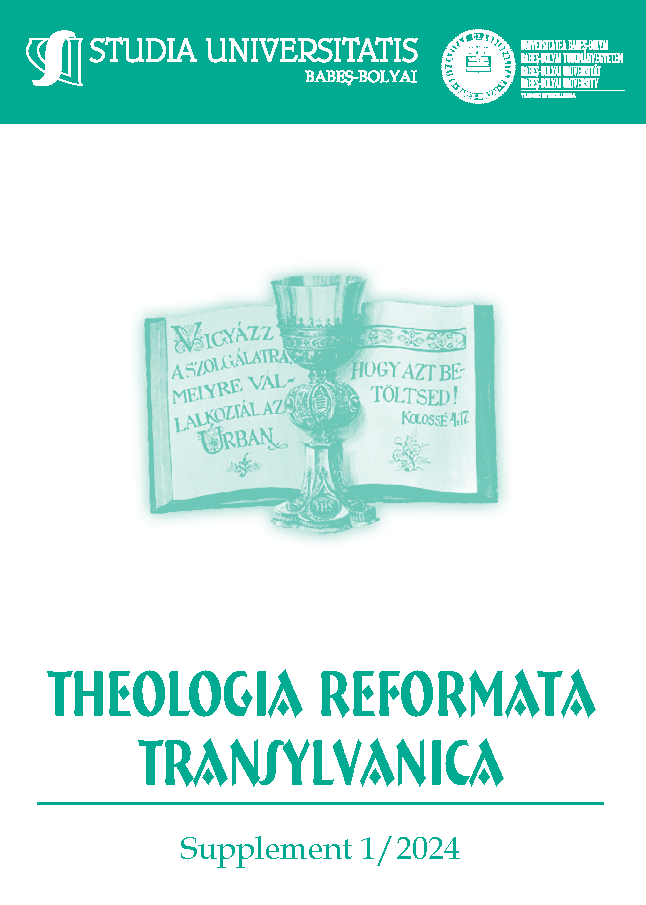“We Must Participate with the Fruits of Our Faith in Building Socialism”. The Preaching Committee in the Danubian Reformed Church District in the Mid-20ᵗʰ Century
DOI:
https://doi.org/10.24193/subbtref.69.suppl1.07Keywords:
Albert Bereczky, Reformed homiletics, history of preaching, preaching, Church historyAbstract
As a result of the communist takeover in 1948, the Bishop of the Danubian Reformed Church District, László Ravasz was deposed, and Albert Bereczky took his place. In the end of 1951, Bereczky wrote a report to the general meeting of the Reformed Church in which he requested the authorization to set up a “preaching committee” with the aim of supervising sermons. He believed it was important for the pastors to talk about issues of their time in sermons because “we don’t preach in a vacuum space but to real people”. In reality, the committee’s function was the full control over pastors and the search for the ideological/theological content (which is called “narrow-road” theology) in preachings. That is why every pastor was asked to send in one sermon that was to be delivered between 1/01/1952 and 25/02/1952. József Bodonhelyi, head teacher of practical theology at the Faculty of Theology of the Reformed Church, who was also member of this preaching committee, wrote notes about these received texts and sermons where he probably appeared in person. We could find certain qualifications in his notes that seriously affected the careers of the pastors (for example, “he doesn’t address the issues of our time”; “his teaching is dangerous”; “he must urgently retire”).
References
A/1b Church governance documents. 1952.
BERECZKY, Albert (1951): IV. püspöki jelentés. Előterjesztette 1951 november 15-én. Budapest.
(1953): Keskeny út. Igehirdetések, előadások, cikkek. Budapest, Református Egyetemes Konvent Sajtóosztálya.
KÖBEL, Szilvia (2015): „Oszd meg és uralkodj!” A pártállam és az egyházak. Budapest, Rejtjel Kiadó.
LÁNYI, Gábor (2019): Bishop Albert Bereczky (1893–1966). A Life Full of Questions. In: Kovács, Ábrahám – Shin, Jaeshik (eds.): Nationalism, Communism and Christian Identity: Protestant Theological Reflections from Korea and Hungary. Debrecen – Gwangju, Debreceni Református Hittudományi Egyetem – Honam Theological University and Seminary. 123–140.
LÁNYI, Gábor (2020a): „Az utolsó meghódítandó” – Társadalmi változások hatásai a Szigetszentmiklósi Református Egyházközségre az 1950-es években. In: Kolumbán, Vilmos József (ed.): Egyház, iskola, művelődés. Egyháztörténeti tanulmányok. Cluj-Napoca, Kolozsvári Protestáns Teológiai Intézet.
LÁNYI, Gábor (2020b): Méltatlanul. Háttérbe szorított dunamelléki református lelkészek az 1950-es években. Budapest, Károli Gáspár Református Egyetem Egyház és Társadalom Kutatóintézetének Reformáció Öröksége Műhelye – Károli Gáspár Református Egyetem Hittudományi Kar Egyháztörténeti Kutatóintézet.
LÁNYI, Gábor (2020c): “Ecclesiastical Authority Terror”. The Downgrading of the Szigetszentmiklós Reformed Parish to Mission Parish in 1956. In: Studia Universitatis Babes-Bolyai Theologia Reformata Transylvanica. 14, 2. 53–78.
LÁNYI, Gábor (2023): Church Disciplinary Procedures in the Early 1950s as Tools of Political Sidelining. In: Bárth, Dániel (ed.): Lower Clergy and Local Religion in 16th–20th-Century Europe. Budapest, MTA – ELTE Lendület Történeti Folklorisztikai Kutatócsoport. 345–366.
LÁNYI, Gábor (2023): „Inkább okos voltam, mint erős”. Ravasz László lemondatásának körülményei (1948). In: Kiss, Réka – Lányi, Gábor (eds.): Ravasz 100 püspöki jelentések. Előadások Ravasz László püspöki beiktatásának 100 éves évfordulója alkalmából. Ravasz László püspöki jelentései 1922–1948. Budapest, Dunamelléki Református Egyházkerület – Károli Gáspár Református Egyetem Hittudományi Kar Egyháztörténeti Kutatóintézet – Kálvin Kiadó.
LÁNYI, Gábor (2024): The Impacts of Ideologies in the History of the Reformed Church in Hungary. In: Kovács, Ábrahám – Jaeshik, Shin (eds.): Church and Society: Biblical, Theological and Missiological Approaches by Korean and Hungarian Protestants. Debrecen – Gwangju (Debreceni Református Hittudományi Egyetem – Honam Theological University and Seminary. 243–257.
PAP, László (1992): Tíz év és ami utána következett 1945–1963. Adalékok a Magyarországi Református Egyház XX. századi történetéhez. Bern – Budapest, Az Európai Protestáns Magyar Szabadegyetem kiadása.
PAP, László – BUCSAY, Mihály (1955): A Budapesti Református Theologiai Akadémia története 1855–1955. Budapest, A Református Egyetemes Konvent Sajtóosztálya.
RÉVÉSZ, Imre – RAVASZ, László – GYŐRY, Elemér – ENYEDY, Andor (1947): Körlevél a magyarországi református egyház valamennyi igehirdetőjéhez a gyülekezeti igehirdetés irányelveiről.
Budapest.
RIGÓ, Róbert (2019): Kettős szorításban. A Bácskiskunsági Református Egyházmegye szerepe a kollektivizálásban (1952–1960). In: Kiss, Réka – Lányi, Gábor (eds.): HIT 2018. Hagyomány, identitás, történelem. L’Harmattan – Károli Gáspár Református Egyetem Egyház és Társadalom Kutatóintézetének Reformáció Öröksége Műhelye – Károli Gáspár Református Egyetem Hittudományi Kar Egyháztörténeti Kutatóintézet.
ZAKAR, Albert (1937): Emlékezet temploma. A Budapest Tisztviselőtelep-Külsőferencvárosi Református Egyházközség gyülekezetének története. Rövid visszapillantással a Budapesti Református Egyház történeti múltjára. Budapest, Bethlen Gábor Irodalmi és Nyomdai RT.
Downloads
Published
How to Cite
Issue
Section
License
Copyright (c) 2024 Studia Universitatis Babeș-Bolyai Theologia Reformata Transylvanica

This work is licensed under a Creative Commons Attribution-NonCommercial-NoDerivatives 4.0 International License.






